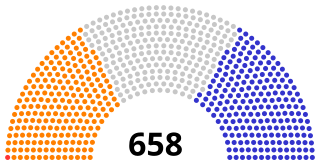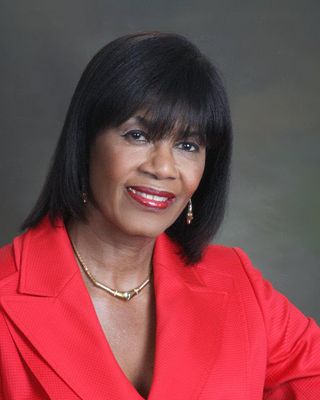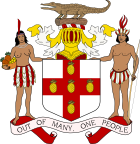
The politics of Gabon takes place in a framework of a republic whereby the president of Gabon is head of state and in effect, also the head of government, since he appoints the prime minister and his cabinet. The government is divided into three branches: the executive headed by the prime minister, the legislative that is formed by the two chambers of parliament, and the judicial branch. The judicial branch is technically independent and equal to the two other branches, although in practice, since its judges are appointed by the president, it is beholden to the same president. Since independence the party system is dominated by the conservative Gabonese Democratic Party.
A general election is an electoral process to choose most or all members of an elected body, typically a legislature. They are distinct from by-elections, which fill a seat that has become vacant between general elections. In most systems, a general election is a regularly scheduled election, typically including members of a legislature, and sometimes other officers such as a directly elected president. General elections may also take place at the same time as local, state/autonomous region, European Parliament, and other elections, where applicable. For example, on 25 May 2014, Belgian voters elected their national parliament, 21 members of the European Parliament, and regional parliaments.

Elections in Sweden are held once every four years. At the highest level, all 349 members of Riksdag, the national parliament of Sweden, are elected in general elections. Elections to the 20 county councils and 290 municipal assemblies – all using almost the same electoral system – are held concurrently with the legislative elections on the second Sunday in September.

New Zealand is a representative democracy in which members of the unicameral New Zealand Parliament gain their seats through elections. General elections are usually held every three years; they may be held at an earlier date at the discretion of the prime minister, but that usually only happens in the event of a vote of no confidence or other exceptional circumstances. A by-election is held to fill an electorate vacancy arising during a parliamentary term. Election day is always a Saturday, but advance voting is allowed in the lead-up to it. The most recent general election took place on 14 October 2023.
A snap election is an election that is called earlier than the one that has been scheduled. Generally, a snap election in a parliamentary system is called to capitalize on an unusual electoral opportunity or to decide a pressing issue, under circumstances when an election is not required by law or convention. A snap election differs from a recall election in that it is initiated by politicians rather than voters, and from a by-election in that a completely new parliament is chosen as opposed to merely filling vacancies in an already established assembly. Early elections can also be called in certain jurisdictions after a ruling coalition is dissolved if a replacement coalition cannot be formed within a constitutionally set time limit.
Canada holds elections for legislatures or governments in several jurisdictions: for the federal (national) government, provincial and territorial governments, and municipal governments. Elections are also held for self-governing First Nations and for many other public and private organizations including corporations and trade unions. Municipal elections can also be held for both upper-tier and lower-tier governments.
Elections in Australia take place periodically to elect the legislature of the Commonwealth of Australia, as well as for each Australian state and territory and for local government councils. Elections in all jurisdictions follow similar principles, although there are minor variations between them. The elections for the Australian Parliament are held under the federal electoral system, which is uniform throughout the country, and the elections for state and territory Parliaments are held under the electoral system of each state and territory. An election day is always a Saturday, but early voting is allowed in the lead-up to it.
A fixed-term election is an election that occurs on a set date, which cannot be changed by incumbent politicians other than through exceptional mechanisms if at all. The office holder generally takes office for a set amount of time, and their term of office or mandate ends automatically.

Elections in Barbados are held to choose members to fill elective offices in the House of Assembly. Elections are held on Election Day. These general elections do not have fixed dates, but must be called within five years of the opening of parliament following the last election. A former minister of the DLP, Warwick Franklin summed up the general elections process in Barbados as saying it is really just, "30 by-elections on the same day."

There are currently two types of elections in Singapore. Parliamentary and presidential elections. According to the Constitution of Singapore, general elections for Parliament must be conducted within three months of the dissolution of Parliament, which has a maximum term of five years from the first sitting of Parliament, and presidential elections are conducted every six years.

General elections were held in Fiji between 6 and 13 May 2006.

The 1807 United Kingdom general election was the third general election to be held after the Union of Great Britain and Ireland.
A term of office, electoral term, or parliamentary term is the length of time a person serves in a particular elected office. In many jurisdictions there is a defined limit on how long terms of office may be before the officeholder must be subject to re-election. Some jurisdictions exercise term limits, setting a maximum number of terms an individual may hold in a particular office.

There are five types of elections in the United Kingdom: elections to the House of Commons of the United Kingdom, elections to devolved parliaments and assemblies, local elections, mayoral elections, and police and crime commissioner elections. Within each of those categories, there may also be by-elections. Elections are held on Election Day, which is conventionally a Thursday, and under the provisions of the Dissolution and Calling of Parliament Act 2022 the timing of general elections can be held at the discretion of the prime minister during any five-year period. All other types of elections are held after fixed periods, though early elections to the devolved assemblies and parliaments can occur in certain situations. The five electoral systems used are: the single member plurality system (first-past-the-post), the multi-member plurality, the single transferable vote, the additional member system, and the supplementary vote.

The Fixed-term Parliaments Act 2011 (FTPA) was an Act of the Parliament of the United Kingdom which, for the first time, set in legislation a default fixed election date for general elections in the United Kingdom. It remained in force until 2022, when it was repealed. Since then, as before its passage, elections are required by law to be held at least once every five years, but can be called earlier if the prime minister advises the monarch to exercise the royal prerogative to do so. Prime ministers have often employed this mechanism to call an election before the end of their five-year term, sometimes fairly early in it. Critics have said this gives an unfair advantage to the incumbent prime minister, allowing them to call a general election at a time that suits them electorally. While it was in force, the FTPA removed this longstanding power of the prime minister.

General elections were held in Jamaica on 25 February 2016. The elections were largely a contest between the governing People's National Party (PNP) and the opposition Jamaica Labour Party (JLP). The result was a narrow victory for the JLP, which won 32 of the 63 seats. One political commentator described the poll as "the closest election Jamaica has ever had".

By-elections in Singapore are elections held to fill seats in the Parliament of Singapore that fall vacant in between general elections, known as casual vacancies. In the past, the Government of Singapore took the position that the Prime Minister had discretion whether or not a by-election should be called to fill a casual vacancy in a Single Member Constituency, and could leave a parliamentary seat unfilled until the next general election. However, in the case of Vellama d/o Marie Muthu v. Attorney-General (2013), which arose from a vacancy in Hougang Single Member Constituency, the Court of Appeal held that the Constitution of Singapore obliges the Prime Minister to call a by-election unless a general election is going to be held in the near future. However, a by-election need only be called within a reasonable time, and the Prime Minister has the discretion to determine when it should be held.

Democracy-Dictatorship (DD), index of democracy and dictatorship or simply the DD index or the DD datasets was the binary measure of democracy and dictatorship first proposed by Adam Przeworski et al. (2010), and further developed and maintained by Cheibub, Gandhi, and Vreeland (2009). Note that the most recent dataset was updated 2008.

Trelawny Northern is a parliamentary constituency represented in the House of Representatives of the Jamaican Parliament. It elects one Member of Parliament (MP) by the first past the post system of election. It was one of the 32 constituencies fixed in the new constitution granted to Jamaica in 1944. The constituency has featured in all 16 contested Parliamentary General Elections from 1944 to 2016. The current MP is Tova Hamilton, representing the Jamaica Labour Party, who has been in office since the 2020 general election.

The Dissolution and Calling of Parliament Act 2022 is an act of the Parliament of the United Kingdom that repealed the Fixed-term Parliaments Act 2011 and reinstated the prior constitutional situation, by reviving the power of the monarch to dissolve and summon parliament. As the monarch exercises this power at the request of the prime minister, this restored the power of the prime minister to have a general election called at a time chosen by the prime minister.













